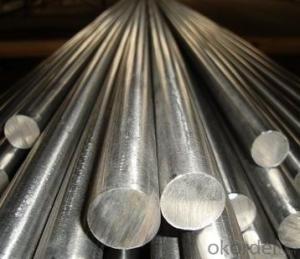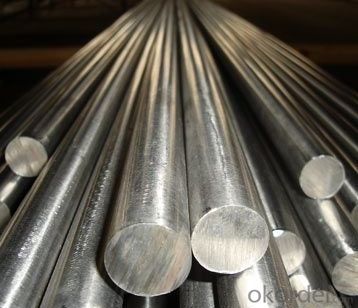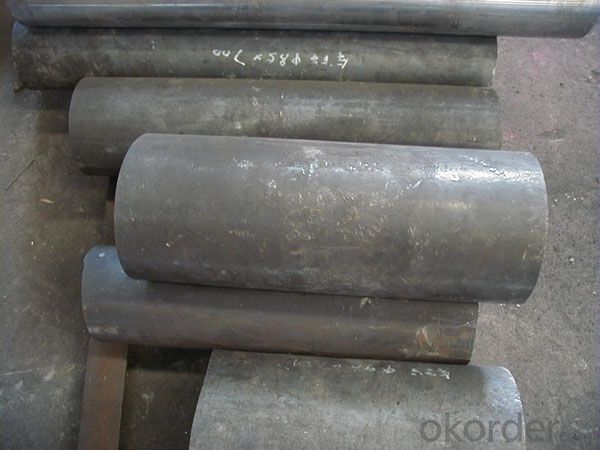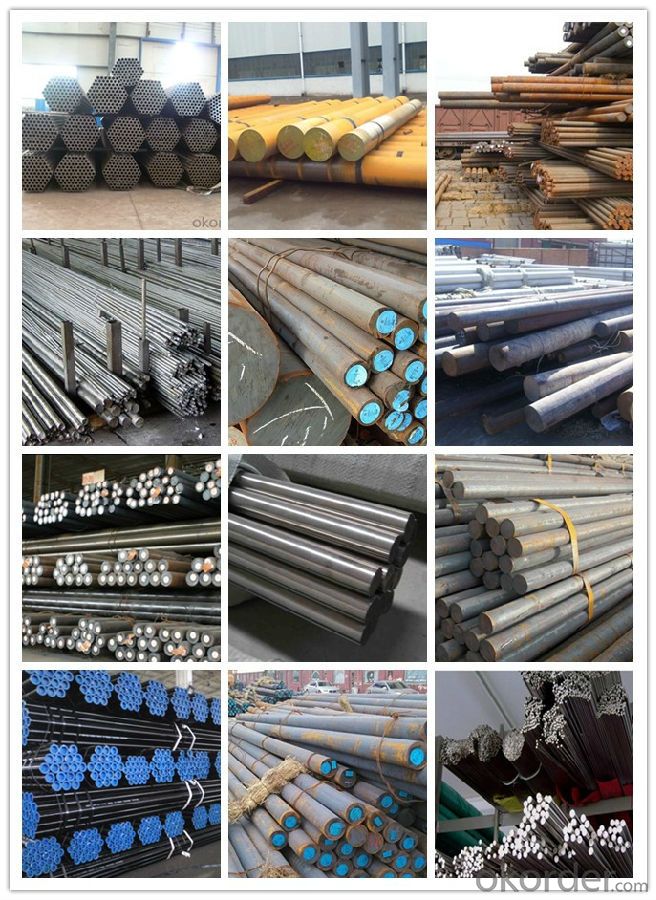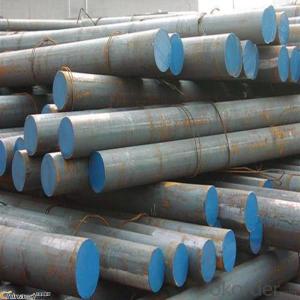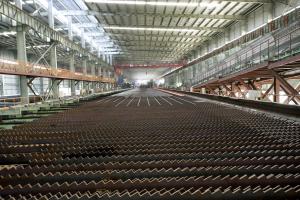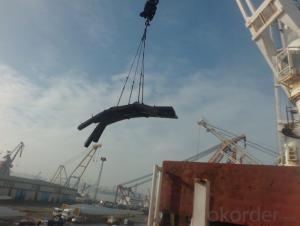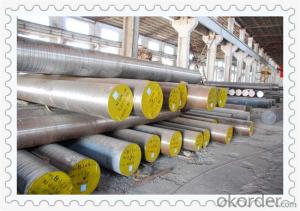Hot-Rolled 15CrMo Steel Round Bar Special Steel
- Loading Port:
- China main port
- Payment Terms:
- TT OR LC
- Min Order Qty:
- 30 m.t.
- Supply Capability:
- 10000 m.t./month
OKorder Service Pledge
OKorder Financial Service
You Might Also Like
Specification
Product Introduction
other material available | Carbon and alloy: Cr-Mo alloy, Cr-Ni alloy, Cr-Mn alloy, Si-Mn alloy |
Dia.: | 10mm~1200mm |
Length: | Random or fixed as required |
Standard | GB,ASTM,JIS,BS |
Out Side Coating | Bare outside |
Ends | Plain ends with color painting |
Packing | Loose bundle |
Delivery | By container/train/lorry |
Third Party Inspection | SGS/BV/LORDS |
Delivery time | 7 days Min. |
Product show
Workshop show
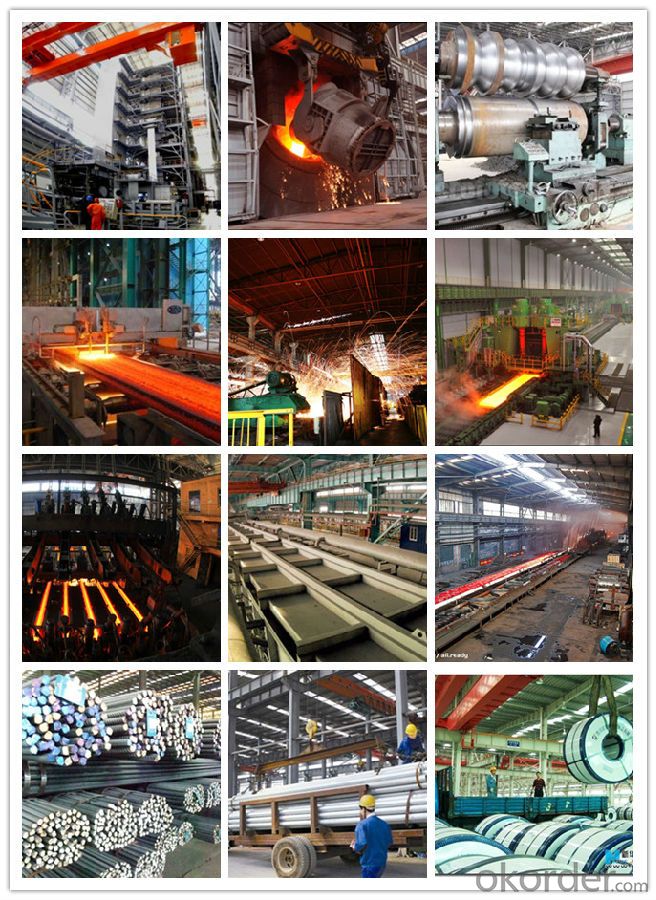
Shipping
1. FedEx/DHL/UPS/TNT for samples, Door-to-Door;
2. By Air or by Sea for batch goods, for FCL; Airport/ Port receiving;
3. Customers specifying freight forwarders or negotiable shipping methods!
Delivery Time: 3-7 days for samples; 5-25 days for batch goods.
Payment Terms
1.Payment: T/T, L/C, Western Union, MoneyGram,PayPal; 30% deposits; 70% balance before delivery.
2.MOQ: 1pcs
3.Warranty : 3 years
4.Package Informations: 1) EXPORT, In 20 feet (GW 25 ton) or 40 feet Container (GW 25 ton)
2)as customer's requirement
Why choose us?
(1) The leading exporter in China special steel industry.
(2) Large stocks for various sizes, fast delivery date.
(3) Good business relationship with China famous factories.
(4) More than 7 years steel exporting experience.
(5) Good after-sales service guarantee.
- Q: How is special steel used in the aerospace manufacturing process?
- Special steel is used in the aerospace manufacturing process for various applications, such as producing critical components like landing gear, turbine blades, and engine parts. The high strength, durability, and resistance to corrosion make special steel an ideal material for these aerospace components, ensuring the safety, reliability, and performance of the aircraft.
- Q: Can special steel be used in mining applications?
- Yes, special steel can be used in mining applications. Special steel, also known as alloy steel, is specifically designed to have enhanced properties such as increased strength, durability, and resistance to wear and corrosion. These properties make it highly suitable for various mining applications where the equipment and machinery are subjected to extreme conditions, including heavy loads, abrasive materials, and exposure to water or chemicals. In mining, special steel is commonly used for manufacturing drill bits, cutting tools, crushing and grinding equipment, conveyor belts, and structural components of mining machinery. For example, drill bits made from special steel alloys have improved hardness and toughness, allowing them to effectively penetrate hard rock formations. Similarly, crushing and grinding equipment that utilizes special steel components can withstand the high stress and impact forces encountered during the extraction and processing of minerals. Moreover, special steel alloys provide better resistance to corrosion and wear, which are common challenges in mining environments. This helps to extend the lifespan of mining equipment, reduce maintenance costs, and enhance operational efficiency. Additionally, special steel can be tailored to meet specific requirements, allowing manufacturers to optimize the performance of mining equipment for different mining applications and conditions. Overall, the use of special steel in mining applications offers numerous benefits in terms of improved performance, durability, and cost-effectiveness. Its unique properties make it an essential material in mining operations, enabling the extraction and processing of minerals in a more efficient and sustainable manner.
- Q: How does surface treatment enhance the performance of special steel?
- Surface treatment enhances the performance of special steel by improving its resistance to corrosion, wear, and fatigue. This treatment creates a protective layer on the surface of the steel, which acts as a barrier against environmental factors such as moisture, chemicals, and abrasive substances. It also enhances the steel's hardness, smoothness, and adhesion, leading to improved durability, strength, and longevity. Additionally, surface treatment can provide aesthetic benefits, such as improved appearance and color options, further enhancing the overall performance of special steel.
- Q: How does special steel contribute to the performance of industrial machinery?
- Special steel contributes to the performance of industrial machinery by providing enhanced strength, durability, and resistance to corrosion and wear. It enables the manufacturing of components that can withstand high temperatures, heavy loads, and harsh operating conditions, thereby improving the overall efficiency and lifespan of the machinery. Additionally, special steel alloys offer excellent machinability and formability, allowing for precise and complex designs, ultimately enhancing the functionality and reliability of industrial machinery.
- Q: What are the different methods of joining special steel components?
- There are several methods of joining special steel components, each with its own advantages and applications. Some of the most common methods include welding, brazing, soldering, and mechanical fastening. 1. Welding: Welding is one of the most widely used methods for joining special steel components. It involves melting the base metals and adding a filler material to create a strong bond. Different welding techniques, such as arc welding, gas welding, or laser welding, can be used depending on the specific requirements and properties of the steel components. 2. Brazing: Brazing is a joining process that uses a filler material with a lower melting point than the base metals. The filler material is heated and distributed between the components, creating a strong bond when it solidifies. Brazing is often used for high-temperature applications and can be done with a torch, furnace, or induction heating. 3. Soldering: Soldering is similar to brazing but uses a lower melting point filler material called solder. It is commonly used for electrical and electronic applications, as well as for joining small or delicate steel components. Soldering requires less heat and can be done with a soldering iron or a hot air gun. 4. Mechanical Fastening: Mechanical fastening involves joining components using mechanical means such as screws, bolts, nuts, or rivets. This method is often used when disassembly or reassembly is required, as it allows for easy removal and replacement of components. Mechanical fastening is suitable for applications where a strong and reliable joint is needed but welding or brazing may not be feasible. 5. Adhesive Bonding: Adhesive bonding is another method used for joining special steel components. It involves applying an adhesive material to the mating surfaces and allowing it to cure or harden, creating a strong bond. Adhesive bonding is often used when a continuous joint is required or when joining dissimilar materials. It is also advantageous for applications that require vibration damping or sealing. Each method of joining special steel components has its own strengths and limitations, and the selection of the appropriate method depends on factors such as the specific requirements of the application, the properties of the steel components, and the desired strength and durability of the joint.
- Q: What are the specific requirements for special steel used in the chemical reactor industry?
- The specific requirements for special steel used in the chemical reactor industry typically include high corrosion resistance, excellent heat resistance, and strong mechanical properties. It should also have the ability to withstand aggressive chemical environments, such as strong acids or alkalis. Additionally, the steel should have low levels of impurities to prevent contamination of the chemical reactions.
- Q: What are the properties of heat-resistant steel?
- Heat-resistant steel has several key properties that make it suitable for use in high-temperature environments. Firstly, it has a high melting point, allowing it to withstand extreme heat without deforming or melting. Additionally, it exhibits excellent strength and toughness at elevated temperatures, enabling it to maintain structural integrity under thermal stress. Heat-resistant steel also possesses good oxidation and corrosion resistance, preventing it from corroding or deteriorating when exposed to oxygen or other corrosive elements at high temperatures. Finally, it has low thermal expansion, ensuring dimensional stability even when subjected to significant temperature changes. Overall, the properties of heat-resistant steel make it a reliable choice for applications in industries such as aerospace, power generation, and petrochemicals, where it can endure and perform consistently under intense heat conditions.
- Q: How does special steel perform in high-temperature mechanical fatigue conditions?
- Special steel performs well in high-temperature mechanical fatigue conditions due to its unique composition and properties. It exhibits excellent strength, toughness, and heat resistance, enabling it to withstand cyclic loading and high temperatures without experiencing significant degradation or failure. The special steel's exceptional performance in such conditions makes it an ideal choice for applications that involve continuous exposure to elevated temperatures and mechanical stresses, ensuring long-term reliability and durability.
- Q: How does special steel contribute to the transportation industry?
- Special steel contributes to the transportation industry by providing high-strength, lightweight, and corrosion-resistant materials for various applications. It is used in the manufacturing of automobile bodies, engine components, and structural parts, enabling vehicles to be more energy-efficient, durable, and safe. Additionally, special steel is utilized in the production of aircraft parts, railway tracks, and shipbuilding, enhancing the performance, reliability, and longevity of these modes of transportation.
- Q: What are the main applications of special steel in the defense equipment?
- Special steel is widely used in defense equipment for its exceptional properties such as high strength, durability, and resistance to extreme conditions. Some of the main applications of special steel in defense equipment include the manufacturing of armored vehicles, tanks, submarines, and naval vessels. It is also used in the production of aircraft carriers, fighter jets, and helicopters, where its strength and resistance to corrosion are crucial. Additionally, special steel is utilized in the construction of ballistic protection systems, missile components, and firearms, enhancing their performance and ensuring their reliability in critical defense operations.
Send your message to us
Hot-Rolled 15CrMo Steel Round Bar Special Steel
- Loading Port:
- China main port
- Payment Terms:
- TT OR LC
- Min Order Qty:
- 30 m.t.
- Supply Capability:
- 10000 m.t./month
OKorder Service Pledge
OKorder Financial Service
Similar products
Hot products
Hot Searches
Related keywords
